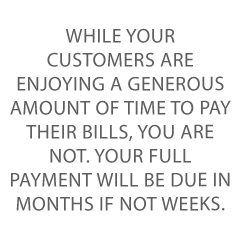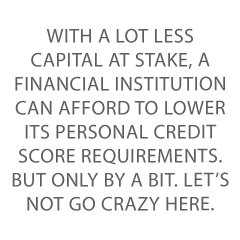Is there such a thing as a credit card processing loan? Why yes, there is! But the real name for it is a merchant cash advance.
Waiting for payments can be hard for a business, particularly a startup. But providing good payment terms to customers makes it easier to convince them to buy from you and not your competition.
How do you rescue your cash flow? MCAs FTW!
Can You Get A Startup Business Loan With No Revenue?
Absolutely zero revenue? Then you’re relying on your personal credit or are providing collateral, or both. Not impossible, but definitely not something you want to be making a habit of. But an MCA is different.
A merchant cash advance is a financing option whereby a startup small business with nearly no revenue can get funding. And, it does not depend on a credit score, so if you have bad credit, you’re in luck.
But merchant cash advance companies will charge a very high rate of interest. And, your repayment terms will be short. How short? How do a few months sound? It’s nothing like a bank loan. Not to mention a monthly fee.
Getting working capital is often a matter of a small business owner assuring a small business loan provider that the business can pay them back. In the absence of cash flow or good credit (either business credit or personal credit), a lender wants collateral.
And while pending card payments and future credit card sales are not collateral per se, they are more or less treated that way by merchant cash advance providers.
But the chances of getting a merchant cash advance will depend on one rather particular thing—the history of credit card payment by the people who owe you cash.
How Does a Credit Card Processing Loan Work?
A business which has a merchant account can and does take a credit card sale. But the buyer does not pay until they are right down to the wire. Or, the business decides to supplement its customer service and also give its customers better payback terms.
Much like the net 30 that you commonly see with starter vendor accounts, the business in question gives its customers additional time to pay.
This can help a startup business gain traction in the marketplace. But it comes at a price—the business now has a cash flow problem. So an MCA is a great solution.
The business essentially sells the unpaid credit card transaction to the MCA provider, in exchange for a substantial percentage of its value.
Payment processing usually stays with the business and not the MCA provider, so the customer is not informed of this development.
As a part of these merchant services, the MCA provider connects to the business’s bank account. The provider receives recurring payment for the cash advances by drawing from even a savings account directly.
These draws can happen on a weekly or even a daily basis. Once the processing loan is paid off, the MCA provider has their cut (called factoring) and the business has financing when they need it the most.
Pros of a Merchant Cash Advance
There are positives to every form of business financing, and merchant cash advances are no exception.
The Ability to Set Favorable Terms for Your Customers
Offering a net 30 is all well and good. But what if you could offer net 90 terms for your customers, without bringing your cash flow to a screeching halt?
Working with a merchant cash advance provider means that you get a percentage of your profits faster, while your customers still enjoy a generous payback schedule.
In fact, your customers need never be the wiser.
Bad Credit is Okay
Having substandard credit is more or less no big deal. Unpaid credit card transactions are valuable, in and of themselves.
Now, your credit will likely still have to be at least in the 500s. But a merchant cash advance may be all you, the owner, can get.
Some form of financing for your small business is better than no financing, yes?
Convenient Payment Method
Simply connect your bank account directly with the provider, and they will draw their recurring payment every week (or day!) without you having to remember to do so.
Many payment software providers like QuickBooks make this type of connection all the time. As a result, it’s often rather easy to do.
Cons of a Merchant Cash Advance
Every silver lining comes with a cloud. Here are some of the downsides to a merchant cash advance.
Short Payback Terms
 While your customers are enjoying a generous amount of time to pay their bills, you are not. Your full payment will be due in months if not weeks.
While your customers are enjoying a generous amount of time to pay their bills, you are not. Your full payment will be due in months if not weeks.
If your business is doing extremely well, and your products or services are selling like hotcakes, you might have no problem meeting such a punishing schedule. But if sales are few and far between (even if they are for substantial sums), it’s a different story.
Constant Draws on Your Account
The merchant cash advance provider will draw on your account whether you’ve had a good sales day or a not so good one. And if yours is a seasonal business, when you have times when there are few if any sales, the provider will draw at those times, too.
Recurring payments happen, no matter what is happening with you and your business.
Interest Rates
A merchant cash advance is kind of in a gray area, when it comes to usury laws. While banks and credit card companies and credit unions are all regulated by the law, MCAs are a different animal.
It’s not the wild, wild West with no laws at all, of course. But merchant cash advance providers are not beholden to, say, the Prime Rate when it comes to just what an interest rate they can and do charge.
The Federal Reserve could do pretty much anything, and they would be unaffected. As a result, expect higher interest rates.
How to Apply For One
The search for this type of capital should take you to one place immediately—the internet.
The application process for credit card processing financing can be fast and easy. Most providers are online and have an online application. Depending upon the provider, you might speak with a representative who will essentially walk you through the process.
This credit card processing provider will make certain you understand all the terms and conditions associated with the MCA. This person can often give you an answer on your application on the same day. This is sometimes within just a few minutes.
Access to this kind of quick capital will require proof of your company’s credit card processing history. To get financing, you will need to show that your customers have good repayment records.
This type of working capital financing will not work unless the business loan provider can get repayment from your customers. The better your customers’ repayment history, the more likely (and more) working capital funding you will be able to get.
Usual Requirements
Virtually every requirement goes directly to either a business’s ability to pay or the ability of its customers to pay. A lot of these requirements are something of a chicken and egg situation. Without some of them, others are close to impossible.
Time in Business
In order to prove the next two requirements, a company can’t have opened yesterday. But time in business requirements tend to be short, sometimes as low as three months—and usually not for more than a year.
Proven Credit Card Sales
These are often calculated on a monthly basis. An applicant will have to prove they can meet a certain minimum, say, $3,000 dollars.
Annual Revenue
This may be expressed in terms of months or sales, but the bottom line is demonstrating all the ways a business can generate revenue. These are not always via credit card. A business could be paid the same way as an MCA provider—via a direct draw.
Owner’s Personal Credit Score
While this number is often lower than for credit union lending or other more traditional forms of financing, it often needs to be at least 500 to 550.
Less Common Requirements
Some providers, such as Square and PayPal, will require that you have been using their platform for at least three months or the like.
Alternatives to Credit Card Processing Loans
#1 – Business Credit
You can’t go wrong with a business credit card. By putting off payments, you can purchase what you need and then pay (before the deadline, of course).
Leveraged credit is as good as the capital you can get from an MCA—and there’s no percentage or fee taken out if you pay the bills for your business credit cards on time.
And business credit can be used not just as an alternative to an MCA, but also as a supplement. A business could offer good terms to its customers, get paid a large percentage by an MCA company, buy on credit, and then pay back its credit bills with the cash from the MCA.
And through it all, virtually none of this entails dipping into business accounts.
Business credit is also an asset. It’s actually worth money! Plus, it helps to build your business’s future. This is something that merchant cash advances can never do.
#2 – Microloans
 Substandard personal credit will make it hard to get most forms of financing. But a microloan is different. With a lot less capital at stake, a financial institution can afford to lower its personal credit score requirements. But only by a bit. Let’s not go crazy here.
Substandard personal credit will make it hard to get most forms of financing. But a microloan is different. With a lot less capital at stake, a financial institution can afford to lower its personal credit score requirements. But only by a bit. Let’s not go crazy here.
Much like with a credit card for your business, a microloan can not only replace a merchant cash advance, it can potentially also supplement one.
Another advantage of a microloan is that it can prove to a lender that your business is responsible and pays its debts on time. This can eventually lead to approvals for larger loans.
#3 – A Cash Flow Loan
This is a loan that is often offered by online lenders. It is generally more familiar to a borrower used to working with a traditional bank or credit union. This is a term loan that can run from three months to four or five years. This depends on the lender.
As always, any origination fees, repayment terms, and available loan amounts will vary from lender to lender.
An easy online application and a quick answer on loan applications makes this an attractive choice. An online loan or line of credit can be a viable option for many small business owners.
#4 – Invoice Factoring
Invoice factoring is relatively similar to credit card processing loans. The main difference is that it doesn’t depend on credit card sales. Invoices could be expected and eventually paid for with not just cash or check, but even a debit card.
A business that doesn’t yet have a credit card processor account can still get sales, although they won’t be card sales as they would be unable to do any credit card processing.
Much like with credit card processing loans, there is a connection made to the business bank account. And again, the business will only get a portion of the outstanding invoice. But like with credit card processing lending, the business can give better terms to its customers.
Takeaways
One of the more intriguing payment solutions for a working capital funding option is the MCA. Businesses with a merchant account can take advantage of this and get a business cash advance.
This solution for fast capital comes from places like Payment Depot.
But there are alternatives out there. Contact us today to leave how to get capital without having to pay outrageous fees and interest rates.

